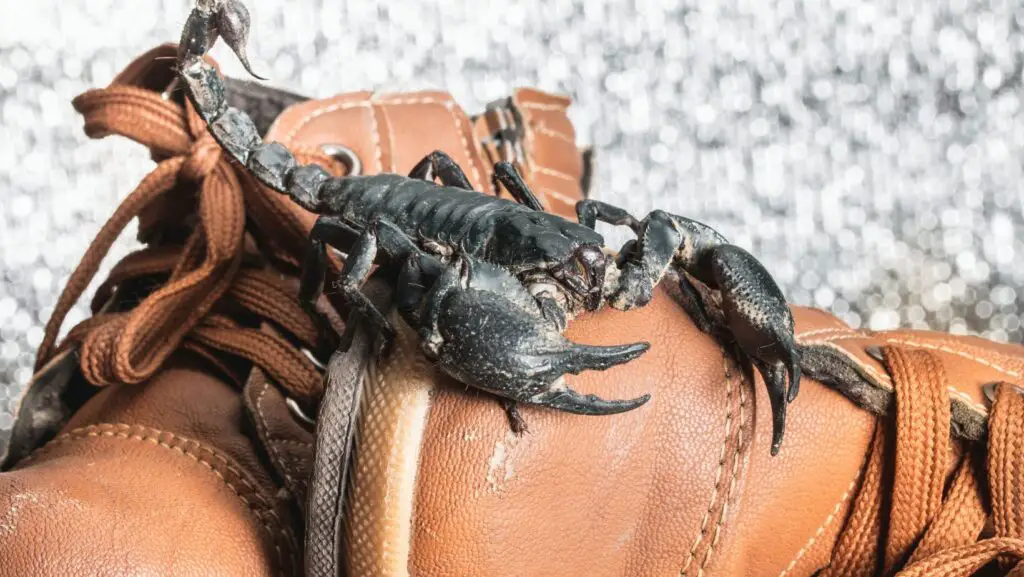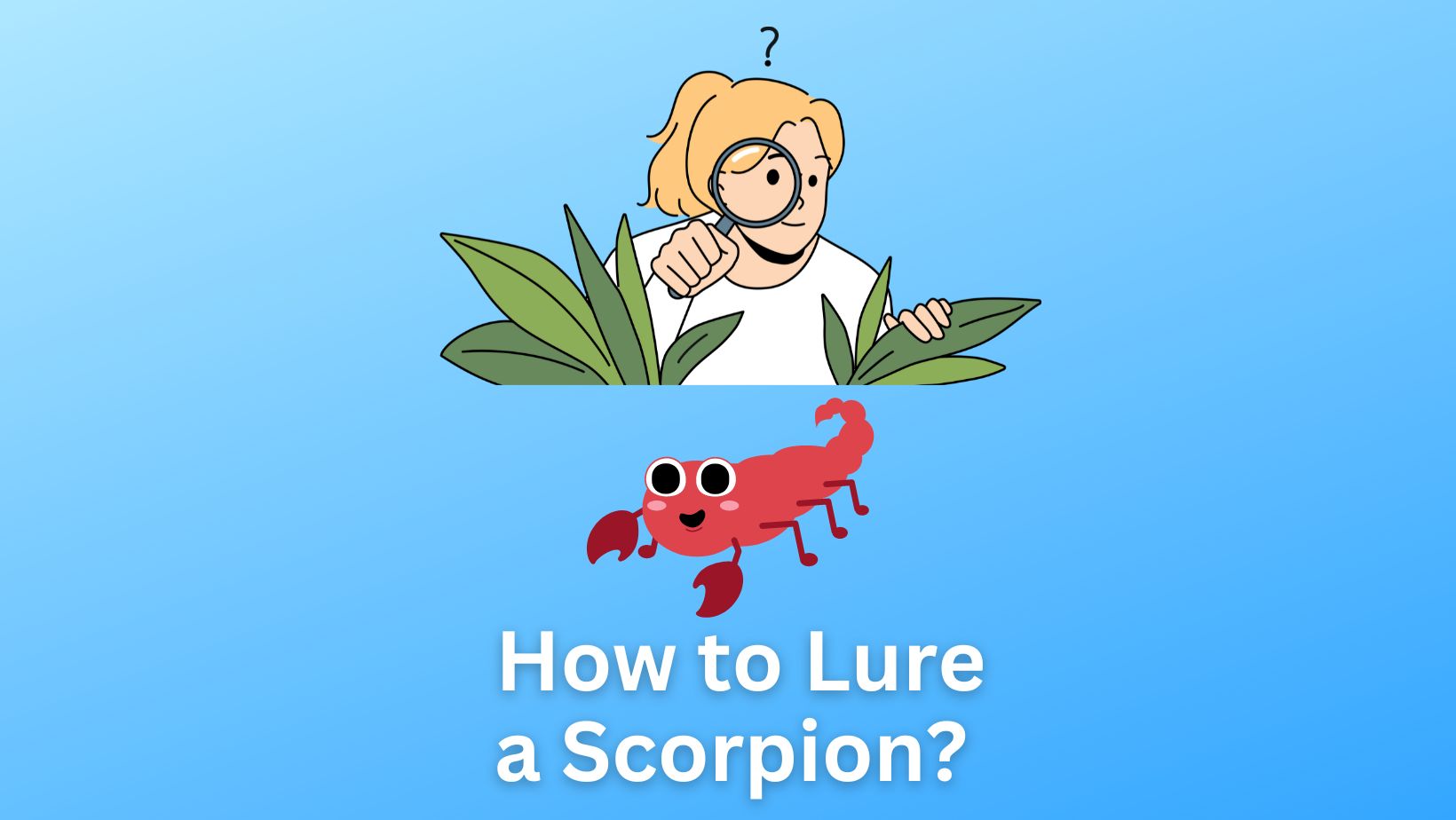- Provide shelter: Scorpions seek shelter during the day, so creating hiding spots can increase the chances of attracting them. Place boards, rocks, or pieces of bark in the desired area to provide dark, secluded spaces where scorpions can hide.
- Use blacklights: Scorpions fluoresce under ultraviolet (UV) or blacklight. Using a UV flashlight or installing a blacklight near the area of interest can help attract scorpions, especially during nighttime. Check local regulations before using UV lights outdoors.
- Create a moisture source: Scorpions require moisture, especially in drier environments. Placing a shallow dish of water or damp towels in the area may attract scorpions seeking hydration.
- Offer prey items: Scorpions primarily feed on insects and small invertebrates. Attracting their prey can indirectly lure scorpions. Provide outdoor lighting near the area to attract insects and other potential prey sources.
- Maintain a suitable habitat: Scorpions prefer areas with suitable environmental conditions. Ensure that the area has appropriate substrate, such as sand or soil, which scorpions can dig into and burrow. Avoid using chemicals or pesticides that could be harmful to scorpions or their prey.
Remember that scorpions are venomous creatures, and caution should be exercised when trying to attract or handle them. If you encounter scorpions, it is advisable to seek guidance from local experts or professionals who can assist you safely and provide specific advice for your region or the species you are interested in.
How to lure a scorpion out of hiding?
If you’re trying to lure a scorpion out of hiding, here are some methods you can try:
- Provide warmth: Scorpions are ectothermic, meaning their body temperature is influenced by the surrounding environment. They tend to seek warm areas. Placing a heat source, such as a heat pad or lamp, near their hiding spot might encourage them to come out.
- Use vibration: Scorpions are sensitive to vibrations and may respond to them. Gently tap or vibrate the area surrounding their hiding spot. This can mimic the movement of prey and potentially attract the scorpion to investigate.
- Shine a light: Scorpions are nocturnal creatures and may be attracted to light sources. Use a flashlight or a focused beam of light to illuminate the area where the scorpion is hiding. Be patient and observe carefully for any signs of movement.
- Create a bait trap: Place a small container or jar with a desirable food source near the scorpion’s hiding spot. Scorpions are opportunistic feeders, so using live prey such as crickets or mealworms as bait may entice them to come out.
- Be patient and observe: Scorpions are cautious creatures and may take time to come out of hiding. Once you have set up the conditions mentioned above, give them some time and maintain a quiet environment. Monitor the area closely and be prepared to act when the scorpion emerges.
Remember to exercise caution and respect when dealing with scorpions. They can deliver painful stings, and some species may be venomous. If you’re unsure or uncomfortable handling scorpions, it’s best to seek assistance from professionals or experts in handling these creatures safely.

How do you find a hidden scorpion?
Finding a hidden scorpion can be challenging due to its ability to blend into its surroundings and nocturnal nature. However, here are some methods you can use to locate a hidden scorpion:
- Conduct a thorough visual search: Scorpions are usually well camouflaged, so a diligent visual search is necessary. Use a flashlight in a darkened room or outdoor area to scan surfaces, cracks, crevices, and other potential hiding spots where scorpions might seek shelter.
- Look for scorpion signs: Keep an eye out for signs of scorpions, such as shed exoskeletons (molts) or droppings. These can indicate that scorpions are present in the area.
- Use UV or blacklight: Scorpions fluoresce under ultraviolet (UV) or blacklight. Use a UV flashlight or install a blacklight to scan the area. Move slowly and carefully, focusing on cracks, crevices, and other potential hiding places where scorpions might glow under UV light.
- Use vibration detection: Scorpions can be sensitive to vibrations. Tap or vibrate the area near potential hiding spots and observe for any signs of movement or response from the scorpion.
- Employ professional assistance: If you suspect a scorpion infestation or are having difficulty finding a hidden scorpion, it may be best to seek help from professional pest control experts or local authorities who have experience in scorpion detection and removal.
Remember to exercise caution and wear protective gear when searching for scorpions. Scorpions can deliver painful stings, and some species may be venomous. If you are uncertain or uncomfortable with handling scorpions, it is advisable to seek professional assistance for safe and effective handling and removal.
Do scorpions hide in clothes?
Scorpions are known to seek shelter in various locations, including clothes and other items that provide dark, secluded spaces. While it is not common for scorpions to actively seek out clothing as a hiding spot, they may accidentally crawl into clothes left on the floor or in dark corners. It’s always a good practice to shake out and inspect clothes, shoes, and other items before wearing them, especially in areas where scorpions are known to be present.
Can scorpions climb beds?
Scorpions have the ability to climb various surfaces, including beds. While they are not adept climbers like some other arachnids, they can use their leg hooks to navigate vertical surfaces. However, it’s important to note that scorpions are generally more likely to hide in cracks, crevices, or under objects rather than actively seeking out beds or bedding materials.
Do scorpions stay away from light?
Scorpions are nocturnal creatures that prefer darkness and are sensitive to light. They typically avoid direct exposure to bright light, as it can be disruptive to their normal behavior. Light can disorient them and make them more vulnerable to predators. However, scorpions may still move around at night and can be attracted to artificial light sources, such as outdoor lighting or indoor lamps. It’s always a good idea to be cautious and avoid leaving bright lights on near potential scorpion habitats, as it may attract them closer to human living spaces.
